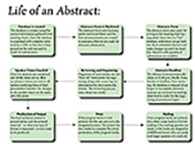TECHNICAL PROGRAM GENERAL INFORMATION
The Conference Exchange, or "Confex" for short, is the system that we use to organize all GSA meetings. This system handles all information from abstracts submittals to publication of the abstracts online to the meeting app.
Technical Program - The Core of Your Meeting
- Primary reason people to come to your meeting.
- A well-rounded technical program allows you to reach out to a more diverse audience.
- Builds (or hurts) GSA’s reputation for quality scientific meetings.
- Never too early to start planning.
Creating Your Technical Program
- Approximately a year before your meeting, you will put out a call for session proposals. Session proposals will then be submitted and approved, and your preliminary announcement will be created with that information.
- Get your entire committee involved in brainstorming a well-rounded program because the number, diversity, and quality of sessions will directly affect meeting attendance and success.
- If you find something missing from your program (like Quaternary or Planetary, etc.), solicit ideas and beat the bushes for someone who is willing to pull together a theme session (including finding authors, being a session chair, and otherwise organizing the session).
- Think about pairing up theme sessions with field trips. Take advantage of local geology and expertise (which probably dovetails with section members’ interests).
- The online abstracts form is built based on information from your preliminary announcement. After printing, additional sessions can be added to the end of the current listing. From time to time, late breaking sessions are also added to the program after the preliminary announcement is printed.
The Technical Program Process

- Sessions are created within the Conference Exchange (“Confex”) online database by GSA. This is a "live" database. When an abstract is submitted, it's actually being submitted directly into this system for easy access and organizing by the committee. Abstracts are automatically "pooled" together either by session or by discipline within Confex.
- Two to three weeks before the abstracts deadline, GSA staff will arrange a time to conference call with the technical program chairs (TPC's) to go through database operations and some processing tasks for which they will be responsible. TPC's will be trained to use the Confex system in detail at that time. The timeline for organizing sessions will also be discussed, as well as the distribution of responsibilities between TPC's and session chairs.
- The abstract deadline will not be extended. It’s a hard deadline because:
- You need the program books to arrive in time for the meeting.
- We’ve found that extending the deadline doesn’t produce many more abstracts.
- If the weather is a factor for low abstracts submission, we’ll jointly decide what to do at that point.
- After the abstracts deadline, the session chairs and the technical program chair have two to three weeks to fully organize the technical program. This includes deciding which sessions will be combined, deleted or added, and finalizing the technical program schedule. GSA staff will help with this process.
- The three weeks after the abstracts deadline is when TPC's should be prepared to be available to focus on organizing the technical program. TPC's should be available to address any questions or concerns from session chairs quickly in order for the process to stay on track and run smoothly. Session chairs should be available to be contacted during those three weeks, and expect to be engaged in doing the work of organizing their sessions during the second and third week after the abstracts deadline.
- It is critical that all abstracts be peer-reviewed by session chairs. The reputation of the organization, and the section, as reflected through the technical program rests on your shoulders, so please encourage your session chairs to review carefully.
- For GSA’s annual meeting, one oral abstract and one poster can be presented by each person (not including invited abstracts); for your section meeting, you should decide how many oral presentations to allow each speaker. Keep in mind the possibility of speaker conflicts increases with each additional oral presentation.
- Once the abstracts and sessions have all been given a timeslot, GSA staff will send acceptance notices out to authors. Absolutely no changes to the tech program (this means changes to scheduling or individual abstracts) can be made after this time.
- GSA then begins the process of creating and publishing the program book, and putting the program info up online.